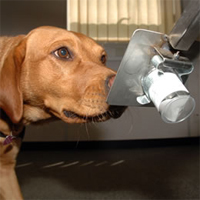Dr. Claire Guest knows firsthand how amazing dogs are. As the director of United Kingdom based charity Medical Detection Dogs, she spends her time training dogs to become Medical Alert Dogs, using their extraordinary olfactory abilities to sniff out human diseases such as diabetes, hypoglycemia, and seizure disorders, among others.
In 2009, one year after starting Medical Detection Dogs, Dr. Guest was busy training her own Labrador Retriever puppy, Daisy, to detect the scent of cancerous tumor cells. Then one day, the normally docile Daisy started acting strangely.
“She kept jumping up on me,” Dr. Guest tells The Telegraph. “One day she bumped into my chest with her nose. It was unusually sore, and there seemed to be a lump there. I did a fine needs biopsy, but it came back clear.”
But Daisy wasn’t convinced — the loyal Lab new something was desperately wrong, and she became more and more persistent with her warnings. Dr. Guest decided to get a second opinion. A core needle biopsy confirmed what the fine needle biopsy did not detect, and Dr. Guest was diagnosed with breast cancer. Treatment was initiated immediately, and she was able to overcome the often-deadly disease.
Daisy was right all along. Dr. Guest knows if it weren’t for her dog, she might not have pulled through.
“Had I not had Daisy’s early warning, I would have had a very poor prognosis,” Dr. Guest explains. “I have my dog to thank for the fact that I’m standing here today.”
Fast-forward nearly four years and Daisy is now the “advanced cancer dog” for Dr. Guest’s organization, with an accuracy rating of over 76 percent. Though some in the medical community are still skeptical about the accuracy of Medical Alert Dogs like Daisy, Dr. Guest is hoping that by sharing her own story, more doctors will come on board.
Take Mount Vernon Cancer Centre Senior Oncologist, Dr. Alan Makepeace. “Like many clinicians, I was initially very dismissive of the idea of dogs detecting cancer,” Dr. Makepeace explains. Dr. Makepeace was a skeptic — but one visit to the Medical Detection Dogs headquarters was enough to change his mind.
“The data is robust,” Dr. Makepeace says. “Dr. Guest’s passion is driven by good science, not anecdotal evidence. There is so much we don’t know about the natural world. A more effective early test could be worth its weight in gold.”
Dr. Guest, along with pioneer researcher Dr. John Church, formed the first Medical Alert Dogs study at the Buckingham NHS Trust in 2004. Their findings, which proved promising, were published in the British Medical Journallater that same year. Dr. Guest hopes more funding will lead to further and more comprehensive studies in the near future.
Sources: The Telegraph, Medicaldaily.com





